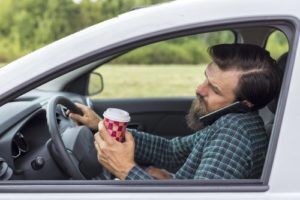
A recent report says more than 800 people who died in car accidents in 2018 were back seat passengers who were not wearing seat belts. Half of those accident victims could have survived the crashes by buckling up, the Governors Highway Safety Association (GHSA) says.
The GHSA report, entitled “Rear Seat Belt Use: Little Change in Four Years, Much More to Do,” is a follow-up to a 2015 report that said a lower percentage of rear seat passengers wear seat belts compared to front seat occupants. In vehicles involved in fatal crashes, only 60% of rear seat passengers were belted, the researchers said.
The GHSA called on states to enforce rear seat belt use laws and to promote belt use in both rear and front seats.
Seat belt use among rear seat passengers is 14 percentage points lower than in the front seat, the GHSA says. Rear seat belt use is lower in for-hire vehicles – taxis, Lyft, Uber – than in private vehicles, and trips in for-hire vehicles are increasing.
In North Carolina in 2017-2018, there were 506 rear seat occupants age 8 or older in fatal car accidents, and 62.2% of them were wearing seat belts. Across the U.S., the percentage was 64.4%.
North Carolina Law Requires Seat Belts for All Passengers
North Carolina addresses back-seat seat belts by law in G.S. 20-135.2A. When the N.C. law was enacted in 1985, the statute required front seat passengers to wear seat belts. Those old enough will remember a big public relations campaign to publicize the new law.
However, less attention was given to the 2006 amendment to the law, which requires that each occupant of a motor vehicle manufactured with seat belts have a seat belt properly fastened about his or her body when the vehicle is in forward motion on a street or highway.
A separate statute, G.S. 20-137.1, requires that drivers with passengers younger than 16 years old ensure that such passengers are secured in a seat belt or child passenger restraint system (child’s car seat).
A post by the UNC School of Government’s North Carolina Criminal Law blog points out that a handful of exceptions to the seat-belts-for-all-occupants requirement are listed in G.S. 20-135.2A(c). The exceptions include people with medical or physical conditions that make restraint a problem, rural letter carriers, people in the back of RVs, and others.
But the amended law also makes not wearing a seat belt in the back seat of a vehicle a secondary offense. This means, if a police officer somehow saw that back seat occupants were not wearing seat belts, he would not have cause to stop the car. If the officer saw that a front seat occupant was not belted, that is a primary offense, so he could stop the vehicle and issue tickets for each occupant.
North Carolina is one of 11 states that treats not wearing a seat belt in the back seat as a secondary offense. The GHSA recommends that all states pass seat belt laws making failure to buckle up a primary offense and that states publicize the benefits of buckling up in every seat position.
Seat Belt Violation Penalties in North Carolina
 If you are ticketed for not wearing a seat belt in North Carolina, the driver of the vehicle will be held responsible for himself or herself and all children younger than 16 years old. Passengers who are 16 or older are responsible for themselves and can be ticketed.
If you are ticketed for not wearing a seat belt in North Carolina, the driver of the vehicle will be held responsible for himself or herself and all children younger than 16 years old. Passengers who are 16 or older are responsible for themselves and can be ticketed.
The penalty in North Carolina for not wearing a seat belt in the front seat is $25.50. But the court costs are $147.50 in a district court or $154.50 in superior court, plus other fees.
The fine for not wearing a seat belt in the back seat of a vehicle in North Carolina is $10. There are no additional court costs.
No driver license or insurance points are assessed for violations of North Carolina seat belt laws.
Why Wear Seat Belts in Back Seats?
 Seat belts protect back seat occupants, the GHSA report says. Studies say that lap-shoulder belts are 44% effective in preventing fatalities in rear seats in passenger cars and 73% effective in light trucks and vans.
Seat belts protect back seat occupants, the GHSA report says. Studies say that lap-shoulder belts are 44% effective in preventing fatalities in rear seats in passenger cars and 73% effective in light trucks and vans.
Of the 803 unbelted rear seat passenger vehicle fatalities in 2018, 426 were in passenger cars and 377 were in light trucks and vans. If all had been belted, the GHSA says, about 187 of the passenger car fatalities and 275 of the light truck and van fatalities would have survived— about 462 in all.
A University of Virginia study found that a driver wearing a seat belt was substantially more likely to suffer a fatal injury when rear seat passengers were not wearing a seat belt.
When a car crashes with a passenger in the back seat who isn’t using a seat belt, the unbelted rear-seat passenger can slam into the driver’s seat, pushing the driver into the airbag and steering wheel with a 35-mile-per-hour impact, says a USA Today report citing an Insurance Institute for Highway Safety (IIHS) study.
“In the rear seat, a lap/shoulder belt is the primary means of protection in a frontal crash. Without it, bodies can hit hard surfaces or other people at full speed, leading to serious injuries,” said Jessica Jermakian, an IIHS senior research engineer and a co-author of the study.
What If You’ve Been in A Car Crash Without A Seat Belt On?
While you should always wear a seat belt, not wearing one cannot be held against you in the event of a car accident that another driver caused. The same law that says you must wear a seat belt says, “Evidence of failure to wear a seat belt shall not be admissible in any criminal or civil trial, action, or proceeding,” except a proceeding about the seat belt violation itself.
In other words, you may still pursue a personal injury claim for compensation if you have been injured in a car accident while not wearing a seat belt in North Carolina. If you are on your own, the other driver’s insurance company might unscrupulously suggest that you were to blame for your injuries by not wearing a seat belt. If you have engaged a knowledgeable car accident attorney to assist you, this is one tactic the insurance company won’t try to use.
To understand your legal options if you have been injured in a car accident in central and southeastern North Carolina, contact Hardison & Cochran for a free consultation. We have offices in Raleigh, Greensboro, Fayetteville, Dunn, Southern Pines, Durham and Wilmington.




